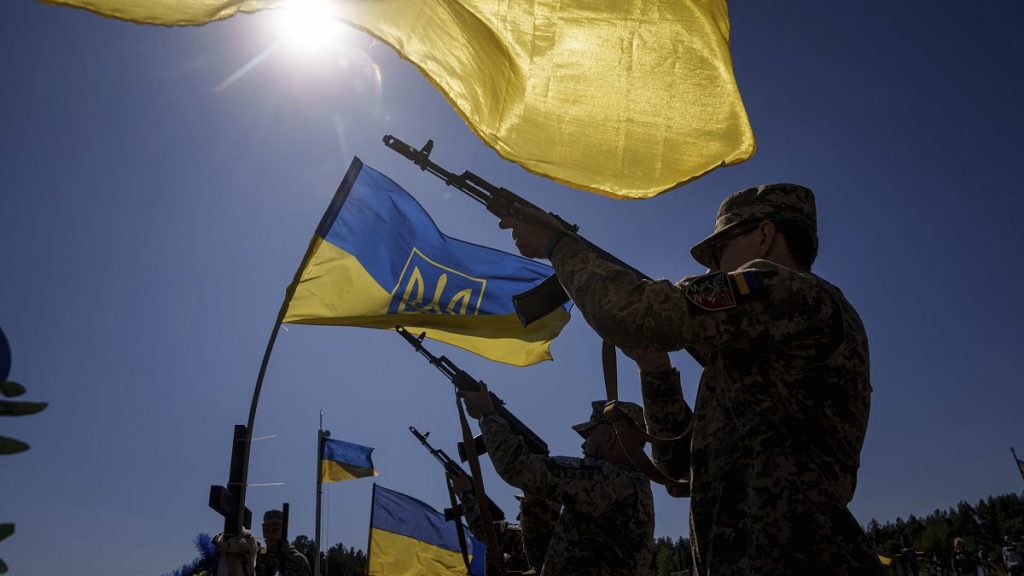German Chancellor Olaf Scholz and Ukrainian President Volodymyr Zelenskyy are in agreement that Russia should be included in future peace conferences to end the war in Ukraine. Scholz emphasized the need for increased efforts to resolve the conflict and move towards ending the war situation faster. The previous international peace conference in Switzerland in June resulted in support for Ukraine’s territorial integrity, but without Russian participation, the path forward remains unclear. Scholz is facing political discontent at home over his government’s support for Ukraine, with populist parties opposing the arming of Kyiv growing in influence. Some members of Scholz’s Social Democratic Party have called for more emphasis on diplomacy towards Russia.
During the Ukraine Defence Contact Group meeting in Ramstein, Ukrainian President Volodymyr Zelenskyy expressed gratitude for the support he received. He urged attendees to expedite the delivery of military hardware to the battlefield, and also requested permission to use those weapons to target Russia more deeply. The Biden administration announced another $250 million military aid package, the UK pledged 650 air defense missiles, and Germany committed to sending 12 self-propelled howitzers to Ukraine. Zelenskyy stressed the need to strengthen Ukraine’s position, protect cities and villages from Russian terror, and provide more opportunities for Ukrainian soldiers at the front lines. He thanked those working and fighting for Ukraine, emphasizing the importance of making the country stronger every day and every week.
On the battlefield, the governor of Russia’s Belgorod region shared photographs showing the aftermath of Ukrainian shelling in the village of Nikolskoe, claiming that two residential buildings were damaged and three people were injured. Russia’s Defence Ministry reported the downing of two drones over the Belgorod region and one in the Kursk region. In Ukraine, intense fighting persists near the town of Pokrovsk, with more than 20,000 inhabitants remaining in the city despite ongoing evacuation efforts by Ukrainian authorities. A recent Russian airstrike on the town hit a local electricity substation, leaving many residents without power. The situation on the ground remains volatile and dangerous for civilians caught in the crossfire.
The call for Russia’s inclusion in future peace conferences comes amid the ongoing conflict in Ukraine, where military aid from Western nations continues to flow into the country to support its defense efforts against Russian aggression. Chancellor Olaf Scholz’s push for diplomacy with Russia reflects growing concerns within his government over the support for Ukraine and the need to find a resolution to the war. President Zelenskyy’s plea for additional military support and permission to strike deeper into Russia highlights the urgency felt by Ukrainian forces as they face continued attacks and disruptions to essential services. The international community’s response to the conflict in Ukraine remains crucial in determining the path towards peace and stability in the region.
The aftermath of Ukrainian shelling in the village of Nikolskoe and the downing of drones over Russian regions underscore the intensity of the conflict and the impact on civilian populations on both sides. The ongoing fighting near Pokrovsk and the recent airstrike on the town’s electricity substation highlight the humanitarian consequences of the war, with residents facing power outages and increased risks to their safety. The need for a diplomatic resolution to the conflict is underscored by the escalating violence and the humanitarian crises unfolding in affected areas. As the conflict continues to escalate, the international community’s efforts to bring about a peaceful resolution become increasingly urgent to prevent further loss of life and suffering among civilian populations trapped in the conflict zone.
The ongoing conflict in Ukraine continues to draw international attention and support, with calls for peace conferences involving Russia gaining momentum. The delivery of military aid to Ukraine and President Zelenskyy’s appeal for enhanced support reflect the pressing need to address the escalating violence and humanitarian crises in the region. The involvement of Western nations in supporting Ukraine’s defense efforts underscores the broader implications of the conflict and the importance of finding a diplomatic solution to prevent further escalation and suffering. As the conflict in Ukraine persists, the need for a coordinated international response and sustained diplomatic efforts remains critical in addressing the root causes of the conflict and moving towards a lasting peace agreement.













